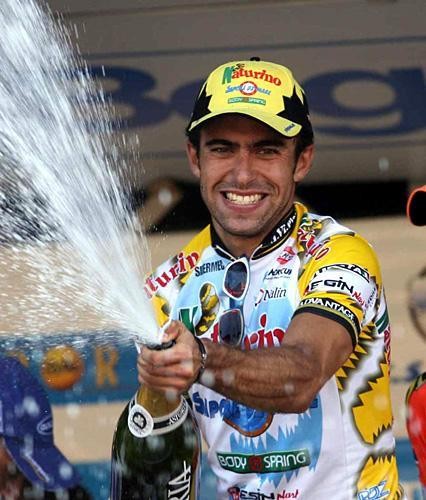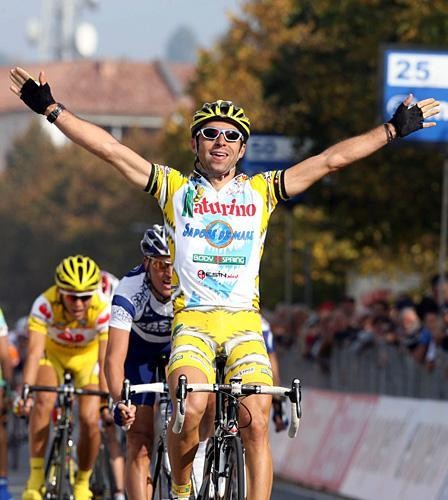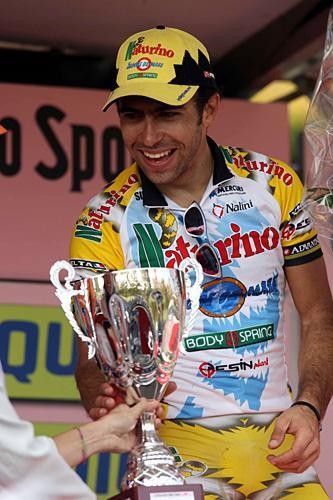An interview with Maurilo Fischer, October 28, 2005
Brazil is not a country that enjoys the same cycling traditions as France, Italy or Belgium. Most...



Cycling's Samba King
Brazil is not a country that enjoys the same cycling traditions as France, Italy or Belgium. Most people prefer football as a sport, Brazil having won the World Cup a record five times. However, Brazilian rider and Naturino Sapore di Mare team member Murilo Fischer is beginning to put his country on the road cycling's world map. Cyclingnews' Hernan Alvarez spoke with Fischer as he relaxed at home about the highs of 2005 and the direction Brazilian cycling is taking.
He comes from a country without a tradition in cycling, so Fischer was doing something a bit different by taking up the sport seriously. "I started riding mountain bikes in July 1995. I did this until the end of 1996, then in '97 I began road cycling," said Fischer. When talking about his passion for the bike, he states "Love is born and nobody knows why. I liked bicycles since I was a kid. I liked bikes and I always went riding with friends to the cross circuits starting at five, six years old. During that time, I always rode bikes, and when I was a bit older, my father brought me a mountain bike as a gift so I started riding it."
Coming from Brusque, in the southern state of Santa Catarina, where he lives when not competing, Fischer enjoys the lifestyle offered by his home country, but realises that Europe is where he needs to be in order to compete against the world's best. The 26-year-old ended the 2005 season by winning the Trofeo Citta Di Castelfidardo, Giro del Piemonte, Milano-Vignola (GP Beghelli) and GP Industria & Commercio Di Prato, plus two Uniqa Classic stages and stage 3 of the Tour of Qinghai Lake. He was second in the Giro del Lazio and the Uniqa Classic, third in the GP Industria & Artigianato and Coppa Bernocchi. This string of strong results, particularly during the latter half of the season helped him win the UCI Europe Tour with 748 points.
He finished an amazing fifth place in the world championships road race in September, taking the status of Brazilian cycling to an all-time high. "It's important to finish fifth, but it's more important to win," said Fischer about his top 10 position in Madrid. "Coming fifth is the beginning of a new order for cycling in Brazil because up to then we went to world's just to make up the numbers." Changing his focus towards a strong result paid off for Fischer, with his fifth place in a field boasting names such as Petacchi, Van Petegem and McEwen. "For me, it's important because it was the first world's that I did with the goal of getting a good result. Last year I rode the Verona world's but was having problems in one of my knees and I abandoned. I went to Madrid wanting to ride well, wanting a top ten spot."
In relation to this year's world's, he added "I started thinking of riding a very good race at world's. From start to finish, I was so very concentrated. I somehow knew that the last three laps were decisive to win or to lose the race. That's why I was always up the front at the top of the big group." Fischer managed to find the right wheel and rode a smart race from there. "When I saw [Paolo] Bettini and Alexandre [Vinokourov] changed the pace, I knew I couldn't follow them. But I saw that [Peter] Van Petegem and [Tom] Boonen were doing good turns, so I followed Boonen's wheel on the last climb with 12 kilometres left where the group broke. I was going fine and was just behind Boonen when the gap was made." From there on it was a matter of staying with the big Belgian and taking the fast, magical carpet ride to an excellent result at the finish.
As can be seen in his world's performance, Fischer prefers the classics rather than longer stage races. "I think my body is better adapted to do one-day races. In order to do the Giro, Vuelta and Tour, you should be a very strong climber." Fischer doesn't like mountainous stages very much. "We leave the mountain stages for the climbers," he said with a laugh "when it's a mixed parcours, it's ok. But when there is nothing but mountains, it's not very pleasing for me."
Get The Leadout Newsletter
The latest race content, interviews, features, reviews and expert buying guides, direct to your inbox!
Paris-Roubaix is a race that comes up when speaking about a dream race to win. "I did it last year and I liked it a lot - it's my favourite. However, for next year I would like to do Milan-San Remo very well. I want to prepare myself well, train well here in Brazil with the heat, with all my strength in order to go to Italy at my best."
Fischer was the first Brazilian to win the Giro del Piemonte in 92 years, something that meant a lot to him. "It was an important race, and I'm very glad to have won there." It was an amazing finish to his best-ever season, and from about July onwards everything went to plan. "My objective after July was to always be in the best positions, near the front. The reason is that last year I was off the road on October, November and half of December due to knee problems because of a crash I had during the Tour of Poland. I was inactive for two and a half months and this delayed my whole preparation for this season."
Things started to pick up earlier this year, however, and the results soon came. "I started to ride very well just on April this year, when I won two stages of the Uniqa Classic. Then we went to China to do the Tour of Qinghai Lake at 3000 metres above sea level. When we moved to Italy to ride races in lower altitudes, I felt the difference of that preparation in China. When you win the first, second and third races, everyone in the team works for you and the enthusiasm is greater. I could ride races much better with that kind of enthusiasm."
There was a noticeable difference between racing in China and various western countries, something Fischer was well aware of. "There are differences, but there were teams from Poland, Germany, the US, Japan; from everywhere. A victory there was nice because many people came to watch the stages." Even though many of the spectators knew very little about cycling, "There were thousands and thousands of people watching the stages. I've never been to the Tour de France, but I think in China there were as many people watching as are in the Tour. They came there to watch something new, something strange."
Late in the season Fischer rode the Giro di Lombardia, the last race of the first UCI ProTour. "I started calmly, without worrying about doing well. On the last climb where Bettini attacked, I stayed behind and abandoned. I was relaxed - no problems, and knew that was the end of my season," the Brazilian said assuredly.
It now appears that Brazilian cycling is improving with the likes of Fischer riding well in Europe. "It did so very much," says Fischer. "Because now we have Bruno Caloi as president [of the Brazilian Cycling Confederation]. He sponsored the Motorola team with Caloi bikes; he likes cycling a lot. He is a very important person here in Brazil and cycling improved very much with him. We are going the right way."